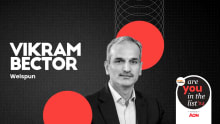Whispered secrets of CEOs

Modern businesses can take a leaf or two from the greatest sporting event on the planet – the Olympics. The Olympic motto – Citius, Altius, Fortius (Latin for Faster, Higher Stronger) – proposed nearly two centuries ago is the perfect aphorism to describe business as we see it today thanks to its unrelenting quest for faster innovation cycles, higher efficiencies and stronger customer relationships.
And who better to power it than a new breed of top-performing CEOs? They are now tapping into the secret well that was only understood by world-class athletes earlier – Coaches.
The world’s best athletes take the help of dedicated coaches to achieve their best by pushing boundaries and breaking barriers. Behind those superstars are the coaches who plan their programmes and put them on the path to success.
At the 2012 London Olympics, swimmer Michael Phelps paid a rich tribute to his coach of nearly 18 years Bob Bowman. Attributing his 22 Olympic career medals, of which 18 were gold, to Bowman, he said, “He has been the one person that’s got me where I am today. He’s the best coach for me.” Those in the inner circle of Phelps say that Bowman is a father figure, a friend, a business partner, an adviser, a spokesman, even a bit of a bodyguard.
“I would say that the reason we have done so well together is that we are both absolutely honest with each other all the time,” Bowman, 47, told in an interview to The Baltimore Sun. “For a swimmer, I’m their eyes out of the water. They can’t see what they’re doing. A lot of the times what you think you’re feeling isn’t exactly what you’re supposed to be doing. The most important thing a coach provides is feedback. Also, I think we give guidance and motivation and some other things. The coach really is a partner in your activity, and I think it’s so much better when you have one,” he said.
Bain CEO John Donahoe said, “CEOs realise they need to be the world-class athletes of business.” “Contrary to being a sign of weakness, it’s now perceived as a strength if people are getting help and investing in themselves.”
The top CEOs are turning to coaches or are being actively persuaded by their Board of Directors to take the help of Executive Coaches. Executive Coaches are increasingly being sought to provide the same candid behavioural insights and feedback to CEOs, which would not be easy to get because of their status, overpowering personalities or even highly filtered communication channels and organisational power plays.
The coach then becomes the CEO’s eyes and ears, not casting a Svengali-like influence (a person who exercises a controlling or mesmeric influence on another, especially for a sinister purpose) but more like a trusted and unbiased advocate of his personal growth. The coach communicates by observing and making the CEO realise the personal impact of his behaviours and uses the observed facts to trigger his consciousness only to achieve positive changes.
Take the example of David Pottruck, president and CEO of Charles Schwab & Co., who credits former IBM executive Terry Pearce with transforming him from a sharp-elbowed despot into a sensitive consensus-builder. Pfizer Chairman Henry McKinnell was so enthusiastic about the feedback he got from coach Dan Ciampa that he posted his own performance review on the company’s internal website.
Athlete Usain Bolt created a new Olympic record in London 2012 running 100m in 9.63 seconds. The race was so fast that the top three medallists ran it under 9.7 seconds…unbelievable!
Bolt identified what made his coach Glen Mills special: “There are times when you want to doubt yourself,” he admits. “But coach is always there to say, ‘Don’t worry, I know what I can do to make you run faster, and what you need to do to go faster.”
Executive coaches help CEOs stay motivated, focused on their goals no matter how many distractions abound and handle their perceived loneliness at the top. Bob Nardelli, former CEO of Home Depot, puts it more succinctly: “I absolutely believe that people, unless coached, never reach their maximum capabilities.”
CEOs need that extra push and such coaches help them to stretch their self-beliefs even further and create a protected space to be questioned and held accountable for their commitments. Some of the most effective coaches are using innovative practices to break inhibiting and self-destructive behaviour. CEOs find experienced coaches as a safe sounding board for their ideas, especially in ensuring that all risks have been understood and the impact across complex business operations factored in by the coaches’ use of questioning techniques.
“My responsibility is to help them look inside themselves as much as outside,” says Dan Ciampa. “Without a coach, a lot of CEOs are likely to give up.”
Executive coaches are also helping CEOs re-discover their work-life balance and re-energising them, helping them deal with burnouts. Sometimes, the celebrity CEO gets so caught up in his own image that he isolates himself from ground realities. This can be highly dangerous in companies that have a large number of employees and do business of billions of dollars. Here, the skilful executive coach can tell the CEO how to deal with the situation and not hide from vulnerabilities.
A world class athlete or a top CEO doesn’t use a coach because they are weak-minded individuals; instead, they are supremely confident about themselves to enlist a coach to reach their goals.










